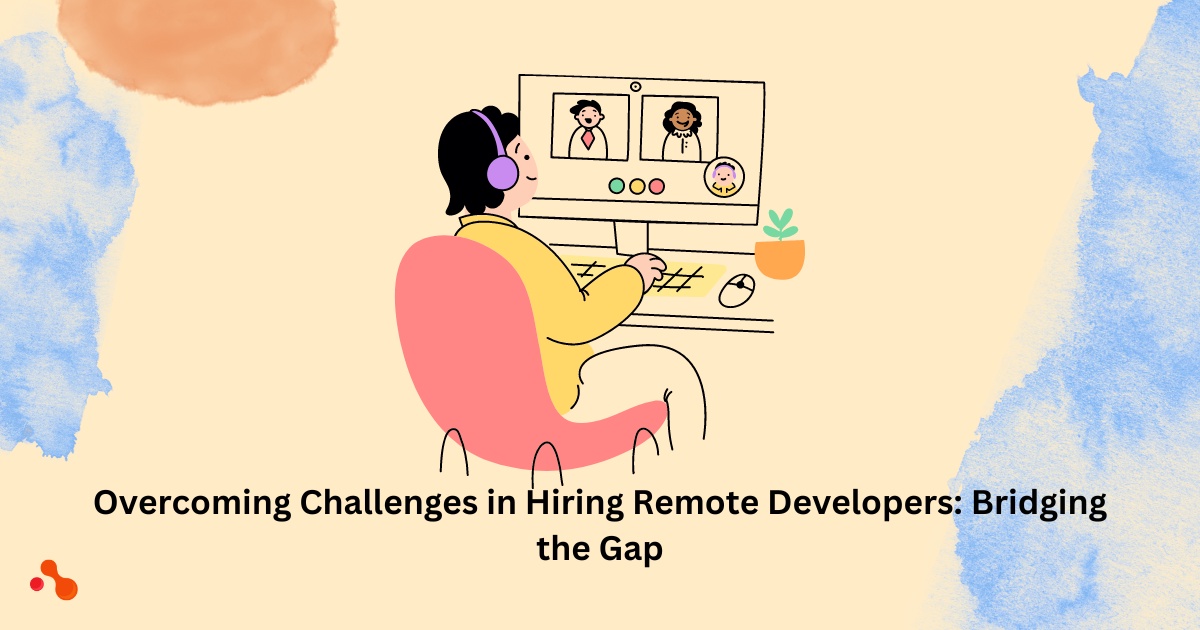Introduction
The increase in remote work has changed the job market, with an increasing number of companies looking to employ remote developers. In today's tech-driven and globalized world, remote developers play an essential role in meeting the ever-growing need for technical skills. However, there are a variety of challenges in hiring remote developers. This blog examines these issues and offers strategies to overcome the hurdles in hiring remote developers while ensuring effective team integration and increasing productivity. By overcoming these issues, companies can employ committed remote developers and use their expertise to boost business expansion.
Understanding the Challenges in Hiring Remote Developers
Hire remote developers creates their own unique set of issues that employers must face. Let's look at these issues in greater detail:
A. Insufficient face-to-face interaction and communication difficulties:
- Building relationships and establishing an intimate connection without physical presence is problematic.
- Communication issues due to dependence on digital tools and potential language barriers.
B. The difficulty of assessing technical skills and cultural fit
- Assessing technical proficiency is easier with coding in-person or whiteboard exercises.
- Cultural fit is vital to ensure alignment with corporate values and ethical standards.
C. Differences in time zones and the necessity of coordination:
- Coordinating work schedules in various time zones can result in delays and difficulties when it comes to collaboration in real-time.
- Effective planning and effective communication strategies are crucial to address these issues.
D. Assuring team cohesion and collaboration in a remote setting:
- The process of establishing a sense of unity and cooperation between team members who are located far away can be a challenge.
- Employers must set clear expectations, support virtual team-building exercises, and offer effective communication channels.
By recognizing these issues, employers can take proactive steps to take on them and create strategies to recruit remote developers.
Strategies to Bridge the Gap in Hiring Remote Developers
To efficiently recruit and integrate remote developers into your team, it's essential to employ specific strategies. Here are a few key strategies to make the process more efficient and ensure the success of your remote recruitment process
A. Redefining the recruitment process
- Prioritize the practical communication skills and collaboration skills:
- Ensure you emphasize the importance of strong verbal and written communication skills when hiring.
- Find candidates with work in remote environments.
- Make assessments accessible from a distance and code problems:
- Create assessments that resemble real-world remote working scenarios.
- Code challenges can be completed remotely, allowing you to test your technical abilities.
B. Making use of technology for better evaluation
- Utilize video interviews and whiteboard tools:
- Video interviews are conducted to determine the communication skills of candidates and their remote work experience.
- Utilize virtual whiteboard tools to assess candidates' problem-solving capabilities and technical competence.
- Incorporate technical assessments and code tests:
- Conduct technical and coding tests to assess candidates' coding abilities and problem-solving skills.
C. Promoting a positive corporate spirit and team dynamics
- Create regular team-building events and virtual meet-ups:
- Organise virtual team-building exercises to build camaraderie and strengthen team bonds.
- Create regular virtual meetings to enable the team members to meet and work together.
- Make sure that you are open and honest in your channels of communication:
- Create communication channels that allow remote developers to connect with colleagues easily.
- Facilitate open and transparent communication to enable effective collaboration and sharing of knowledge.
D. Implementing effective systems for onboarding and support
- Offer comprehensive documentation and resources for new employees:
- Create a detailed document on onboarding that includes information on company policies, tools, processes, and policies.
- Provide tutorials in video or FAQs to assist remote developers onboarding.
- Set up buddy systems or mentors to facilitate integration into the team:
- New remote hires can be paired with experts from the team who can guide and assist during the onboarding process.
- Introduce buddy systems to aid in knowledge transfer and ensure new employees feel connected and encouraged.
Implementing these methods will effectively increase your ability to recruit and bring on committed remote developers. Ensuring you can communicate effectively, use technology, create a positive corporate culture, and offer extensive onboarding assistance will help bridge the gap and prepare your remote team for success.
Best Practices for Managing Remote Development Teams
Managing remote development teams is complex; however, you can ensure success with the good practices implemented. Here are some essential best practices to think about:
A. Communication and expectations that are clear:
- Establish frequent and open communication channels to bridge the gap.
- It is essential to clearly define the goals of the project timelines, deadlines, and each person's responsibility.
- Instruct team members to ask questions and give regular updates.
B. Embracing agile project management methodologies:
- Implement agile practices such as Scrum or Kanban to increase efficiency and flexibility.
- Break projects down into smaller tasks, and set priorities together.
- Schedule regular sprint meetings to keep track of progress and identify any blockers.
C. Collaboration and tools for managing projects:
- Use online collaboration tools such as Slack, Microsoft Teams, or Zoom to communicate in real-time.
- Utilize project management platforms such as Trello, Asana, or Jira to track your projects' progress and milestones.
- Encourage document and file sharing using cloud-based platforms such as Google Drive or Dropbox.
D. Regular reviews and check-ins:
- Plan regular audio or video meetings to discuss progress, issues and feedback.
- Conduct performance evaluations to highlight successes and highlight areas to improve.
- Offer constructive feedback and help remote developers develop.
E. Encouragement of continuous learning as well as professional development
- Create a culture of continual learning by offering access to online training courses or resources.
- Encourage collaboration across teams and knowledge sharing to promote professional development.
- Help remote developers attend relevant workshops or conferences.
By following these top practices, you will be able to efficiently manage teams of remote developers, recruit committed remote developers and create a productive and collaborative remote working environment.
Conclusion
In the end, hiring remote developers may pose challenges that must be addressed. The most significant obstacles are:
- Face-to-face interaction is limited.
- It is challenging to judge abilities and their cultural compatibility.
- Time zone differences.
- Maintaining cohesion within the team.
However, there are strategies to overcome these issues. Redefining the recruitment process, leveraging technology for evaluation, creating a positive corporate culture, and offering an extensive onboarding and support system is essential. Accepting remote work and closing the gap by recruiting dedicated developers is vital for companies to adapt and prosper in an ever-changing remote work environment.


No comments yet